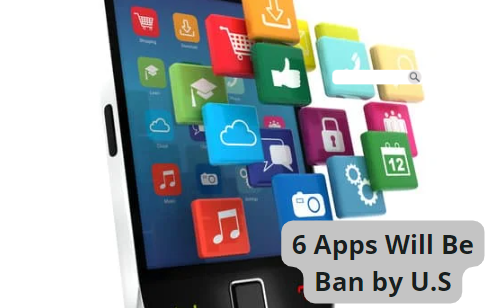What Apps U.S Might Ban? 6 Apps Will Be Ban by U.S
The U.S. government is cracking down on technology companies that they believe pose a threat to national security. Recently, six Chinese apps have come under scrutiny and could face a ban in the United States. The move comes amid rising tensions between China and the U.S., and the government is taking measures to protect American citizens’ data from being accessed by foreign entities. The apps in question are popular among millions of Americans, and the ban could potentially impact their daily lives. From social media to e-commerce and messaging apps, these six apps have become an integral part of our lives. This decision is not only going to affect Chinese companies but also their users in the United States. In this article, we will discuss the potential implications Apps will be ban for the future of tech in the U.S.
The Six Apps will be ban in the U.S. are:

1. TikTok: A popular social media platform that allows users to create and share short videos.
2. WeChat:A messaging app that is widely used in China and has a significant user base in the U.S.
3. Alipay:A mobile payment app that is widely used in China and other parts of Asia.
4. QQ: An instant messaging app that is popular in China.
5. CamScanner: A document scanning and sharing app that is widely used in China and other parts of the world.
6. SHAREit: A file-sharing app that is popular in Asia and other parts of the world.
Reasons behind the potential ban
The U.S. government has cited national security concerns as the primary reason behind the potential ban. The concern is that these apps could provide foreign entities with access to American citizens’ data, which could be used for espionage or other nefarious purposes. The U.S. government has accused China of using its technology companies to spy on other countries, and this ban is part of a larger effort to curb China’s influence in the tech industry.
Impact on users and businesses
The potential ban could have a significant impact on users and businesses. For users, it means losing access to popular apps that they use daily. TikTok, for example, has over 100 million users in the U.S., and its ban could potentially impact the livelihoods of content creators who rely on the app for income. WeChat is also widely used by Chinese Americans to communicate with friends and family in China, and its ban could cause significant disruptions to their daily lives.
For businesses, the ban could mean losing access to a significant market. Chinese e-commerce giant Alibaba, for example, owns a stake in Alipay, and its ban could impact Alibaba’s ability to do business in the U.S. The ban could also lead to retaliation from China, which could potentially impact American businesses operating in China.
Alternatives to the banned apps
If the ban goes into effect, users and businesses will need to find alternatives to the banned apps. For social media, there are several alternatives, including Instagram, Snapchat, and Facebook. Messaging apps like WhatsApp and Telegram could replace WeChat and QQ. For mobile payments, Apple Pay and Google Pay could replace Alipay. However, these alternatives may not be as popular or widely used as the banned apps, which could lead to significant disruptions for users and businesses.
Legal challenges to the potential ban
There are already legal challenges to the potential ban. TikTok has filed a lawsuit against the U.S. government, arguing that the ban is unconstitutional and violates the company’s right to due process. WeChat users have also filed a lawsuit, arguing that the ban violates their free speech rights. The outcome of these lawsuits could impact the future of the ban and app regulation in the U.S.
Public opinion on the Big Ban
Public opinion on the potential ban is divided. Some argue that the ban is necessary to protect national security and prevent foreign entities from accessing American citizens’ data. Others argue that the ban is an overreach of government power and violates free speech and due process rights. The ban has also become a political issue, with some arguing that it is a way for the Trump administration to distract from other issues and appeal to its base.
What can users and businesses do to prepare for the ban?
Users and businesses can take several steps to prepare for the potential ban. For users, it is essential to back up any data on the banned apps and find alternatives for communication, social media, and mobile payments. For businesses, it is essential to diversify their customer base and find alternative markets to make up for any losses in the U.S. market. It is also essential to stay informed about any updates on the ban and be prepared to adapt to any changes.
Conclusion: The future of app regulation in the U.S.
The potential ban on six Chinese apps is just the beginning of a larger trend towards app regulation in the U.S. As technology continues to play a significant role in our daily lives, governments will need to balance the benefits of innovation with the need to protect citizens’ data and national security. The outcome of the legal challenges to the ban will have far-reaching consequences for the future of app regulation in the U.S. and could set a precedent for how governments around the world approach technology and data privacy. As users and businesses, it is essential to stay informed and be prepared to adapt to any changes in the tech landscape.
In conclusion, the potential ban on six Chinese apps in the U.S. has raised concerns about data privacy, national security, and the future of tech regulation. The ban could impact millions of users and businesses, and finding alternatives may not be easy. As the legal challenges to the ban play out, it is essential to stay informed and be prepared for any changes in the tech landscape. The future of app regulation in the U.S. will have far-reaching consequences for the tech industry, innovation, and data privacy.




